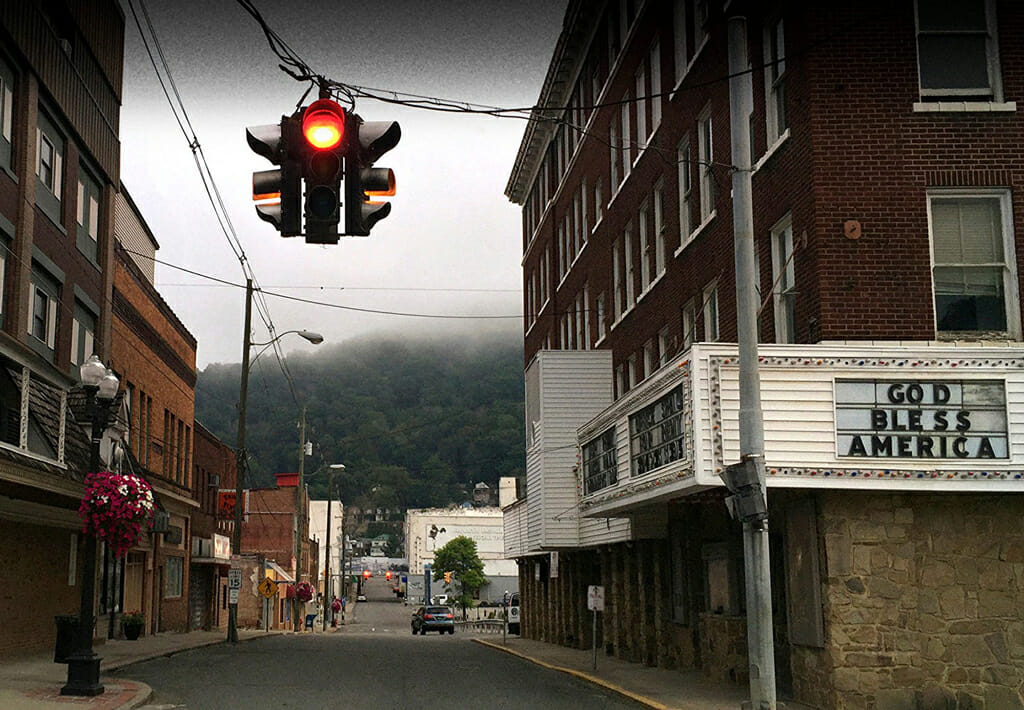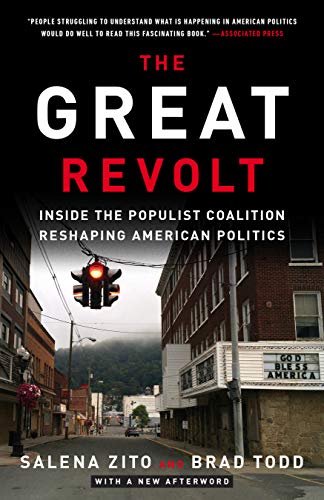Searching for the True Trumpistas
In "The Great Revolt," it's difficult to tell whether the authors' views flow from their insights on the president's voters or if their insights on his voters are curated according to the authors' views. Crown Forum
Crown Forum
“The Great Revolt: Inside the Populist Coalition Reshaping American Politics”
A book by Salena Zito and Brad Todd
It’s hard to know whether to take “The Great Revolt” seriously or literally.
Journalist Salena Zito and conservative political advertising executive Brad Todd have co-authored a new book that provides a taxonomy of 2016 Trump supporters, one that claims to upend the stereotypical narratives of the mainstream press. “We spent time in diners, watering holes, bed-and-breakfasts, and coffee shops, finding Trump voters where they live and work,” they write. Where others saw an irate, dispossessed, racist, uneducated mass eager to burn it all down, Zito and Todd travel through Iowa, Ohio, Michigan, Wisconsin and Pennsylvania, deploying “smart empirical research with on-the-scene, shoe-leather reporting” in search of the true Trumpistas, those “hidden in plain sight.”
Zito became pundit-famous in 2016 for her pithy formulation about Donald Trump’s faithful and the news media: “The press takes him literally, but not seriously; his supporters take him seriously, but not literally.” On such insights are reputations forged and book deals struck. So it’s ironic that “The Great Revolt” commits an offense similar to the one Zito attributes to the press.
The authors do take Trump supporters literally, recording their every utterance and grievance with great fidelity. But I’m not sure how seriously they truly regard them. Zito and Todd lump voters into pat categories and miss chances to engage with them on the origins and depth of their views. And when the book concludes with the authors’ attack against the “multiculturalist militancy pushed by the Far Left” and their sanitizing of Trump’s positions on race and borders as merely the “broadening” or “shifting” of policy debates, the move from analysis to ideology proves jarring. I can’t tell if the authors’ views flow from their insights on Trump voters or if their insights on Trump voters are curated according to the authors’ views.
To their credit, Zito and Todd didn’t just crash campaign rallies or scan the landscape for MAGA caps; they spent time in communities that flipped from Barack Obama in 2008 and 2012 to Trump in 2016. But the classification scheme they develop can at times feel more clever than useful.
Click here to read long excerpts from “The Great Revolt” at Google Books.
The “Red Blooded and Blue Collared” are voters animated by Trump’s pledge to restore America’s manufacturing prowess. The “Perot-istas” feel drawn into the electoral process by mavericky outsiders. The “Rough Rebounders” have experienced professional or health setbacks and admire Trump’s resilience. “Girl Gun Power” describes women under age 45 who view Second Amendment rights as a feminist imperative. “Rotary Reliables” include well-educated, high-income community leaders who embrace the politics of their less-educated, lower-income neighbors. The “King Cyrus Christians” look past Trump’s moral failings and find solace in his judicial appointments. And the “Silent Suburban Moms” may not like to admit that they went for Trump, but they remain skeptical of strictly gender-based appeals for their vote.
These are the groupings that Zito and Todd identify in their travels and dissect through a survey conducted for the book. Rather than the angry hordes of the popular imagination, these individuals are invariably depicted as well-mannered, kind, thoughtful and, above all, “infectious”—their smiles, their laughs, their love of life always seem to be infecting everyone else.
These voters emphasize Trump’s style more than any ideology. “He shows every day that he is sticking up for the country,” explains one Pennsylvania voter. “He was his own man,” declares another. “I just love his moves with North Korea,” remarks a Trump supporter who moonlights as a Kenny Rogers impersonator. “When to hold ’em, when to fold ’em.” (Yes, that’s really the quote.)
Trump often speaks of his election as a movement, and the individuals in “The Great Revolt” certainly see themselves as part of something bigger than one man, larger than themselves. “I don’t know how to explain it except I felt compelled not for me but for my country,” muses a Pennsylvania man. A Trump supporter in Kenosha, Wisconsin, tells the authors that “the vote was larger than him, it was about us, our families and our community and the preservation of our rights.” And a Trump voter in Macomb County, Michigan, declares that “what I feel isn’t an anomaly; this movement unequivocally goes on long past Trump.”
Zito and Todd argue that the condescension of liberal elites energizes Trump supporters. “For a key slice of his coalition, it was attacks on their values on the national stage by a culture careening leftward that drew voters to his bombast,” they write. Or as one Iowa voter told them: “We just felt for the last eight years we were spoon-fed this liberal cultural crap.”
Indeed, these voters’ decisions to support Trump are as much about his opponents and predecessors as about the man. Ed Harry, a former Democrat in Wilkes-Barre, Pennsylvania, promised himself he would never vote for a Clinton or a Bush again—“I thought they were both corrupt”—and found that everyone he had grown to distrust (Democrats, the GOP establishment, Mexico, lobbyists) disliked Trump. “I figured I must have a candidate,” he concluded. And Sally Tedrow, a Silent Suburban Mom in Lee County, Iowa, wishes that Trump “had a softer manner about him,” but that doesn’t really matter, because Tedrow also voted less for Trump than against Hillary Clinton: “I felt like she was not honest.” Zito and Todd do not ask Tedrow what she makes of Trump’s truthfulness, or if they do, we don’t learn about it.
Trump is different, says Renee Dibble of Ashtabula, Ohio, in a particularly memorable passage. “Not because I am blind to his faults, but because the other politicians’ faults are so worse. Because their failures were our lives, and that is unforgivable.”
The authors say America has endured a “cultural change” in recent years, and the voters they feature blame Obama for it. He “ran our country into the ground,” argues a Trump supporter in Lake County, Michigan. A voter in Howard County, Iowa, says Obama spread a “moral decay,” making it so that “everyone has to think his way or it is unacceptable.” Obama is even to blame for any resurgence of racial prejudice. “We’re here in a small town where you could see lots of racism … but I think there was a lot more stuff that would come up because Obama failed to use more common sense when talking about problems the country faces,” explains a voter in Luzerne County, Pennsylvania. “Just say what it is instead of trying to not offend people.”
The interviewees constantly worry about a worsening “attitude of entitlement” throughout the country, saying that “nobody wants to be accountable … nobody wants to be responsible.” As a 70-year-old Pennsylvania woman explains, “I see this culture changing around us in that no one values hard work.” Zito and Todd don’t inquire who these entitled, lazy and irresponsible people might be; their identity is only implied, as when one Rotary Reliable frets that, under Obama, “only some people’s traditions and cultures matter.” Yes, those rhetorically useful some people. And it should surprise no one that, after Trump built his political brand on the lie of Obama’s noncitizenship, survey data cited in “The Great Revolt” shows that the Trump voters in the Rust Belt consider their guy “a more patriotic American” than the guy before. Maybe birtherism is infectious, too.
Not every book must cover everything, of course. Zito and Todd are not required to add Alt-Right Reliables, Birther ‘Burbs or Middle-Class Misogynists to their mix. When the authors wonder about the durability of Trump’s support, they ask, “Was his coalition the product of a candidacy or did he, as a candidate, benefit from a cause that succeeded in spite of him?”
Their book does not settle the question, nor does it persuasively define the cause animating this coalition. They call it “the new populism,” but in many ways their vision of the Trump base seems as partial and euphemized as the conventional journalistic notions they purport to debunk.
In their view, Trump’s racist statements bind his supporters more closely to him only because the mainstream news media overreacts and therefore draws ire from the base. Trump voters support a border wall and a ban on travelers from some Muslim-majority countries as part of their “mistrust of multinational bigness,” nothing more. When he attacks NFL players who kneel during the national anthem to protest police violence, Trump is “shifting the debate away from the protesters’ stated purpose to a debate on patriotism itself,” eliciting “roars of approval” from his base. The Democrats are the race-baiters; Trump supporters merely desire a “restoration of cultural respect.”
All of which may be accurate. In a literal sense.
Carlos Lozada is the nonfiction book critic of The Washington Post.
©2018 Washington Post Book World
Your support matters…Independent journalism is under threat and overshadowed by heavily funded mainstream media.
You can help level the playing field. Become a member.
Your tax-deductible contribution keeps us digging beneath the headlines to give you thought-provoking, investigative reporting and analysis that unearths what's really happening- without compromise.
Give today to support our courageous, independent journalists.







You need to be a supporter to comment.
There are currently no responses to this article.
Be the first to respond.